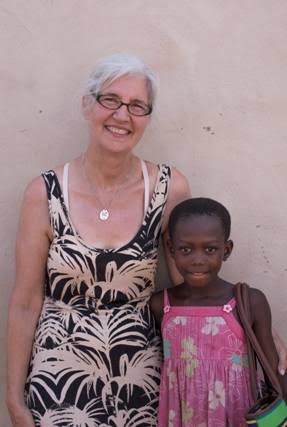Getting around northern Ghana is tough. Not only does the road system peter out in very rural areas, moving from paved to unpaved, but public transportation is inconvenient and slow. Just like home! Unlike home, most people can’t afford cars or bikes. So folks do what we do: they use cell phones to keep in touch. Alice says that cell phones are ubiquitous, and that almost everyone has one or plans to buy one. There is hardly any village, no matter how remote, where there is not a phone. They are so prevalent, that it is common to observe a toddler pick up an object and put it to their ear. Just like home!
Ghanaians don’t tend to have smart phones due to the expense, and Ghana’s internet infrastructure. But a no-frills cell phone is relatively cheap. Most people in villages are not literate, so they ‘dial’ their cell phones using voice commands. They also use their cell phones to play music. This surprised me until I realized that without electricity, they didn’t have much access to recorded music – cell phones opened up new and wonderful possibilities.
But I wondered - how, in remote areas without electricity, do all these cell phone users charge their phones? These villages are truly remote and often consist of mud hut compounds surrounded by agricultural fields. You might see goats or guinea hens. Lizards. You might see a water pump. No stores or identifiable commercial sections.
Alice explained that this is tricky. There are solar energy installations in some places. A few people exercise their ingenuity with dry cell batteries. Most people have to travel 2-4 miles, to another village, to charge their cell phones. Once they arrive at the home or small business, they must pay cash for the charge. What a seriously inconvenient way to have to do something that we find so simple and routine.
People who are fortunate enough to live in a village that has been electrified via Ghana’s ongoing rural electrification program have literally experienced changed lives. They can charge their cell phones at home, at a radically lower cost in personal time and cash. For them it is much, much easier to keep in touch with loved ones.
Because of PAMBE Ghana’s major role in bringing education to one of the more remote areas of northern Ghana, one which the government might not have been able to address for several years, the local authorities have put the village of Bomboazio, nearest to La’Angum Learning Center, next in line for rural electrification. This benefit may not be realized immediately, but it’s coming. All because PAMBE Ghana, led by Alice Iddi Gubbels, dared to step in and start the process of change, enlisting the cooperation of the local community: private citizens, civic groups, business and governmental entities. Many hands make light work.
________________________
Judy has called Oklahoma home since 2009. She became aware of PAMBE Ghana from her book group, signed up to staff the Global Market in 2010, and since then has served in many capacities, including as administrative coordinator. She is currently on the Board. She is also on the Board of deadCENTER Film Institute, volunteers with the Oklahoma Food Coop, and is a Master Gardener. Judy has a background in marketing and communications with for profit and non-profit organizations.

